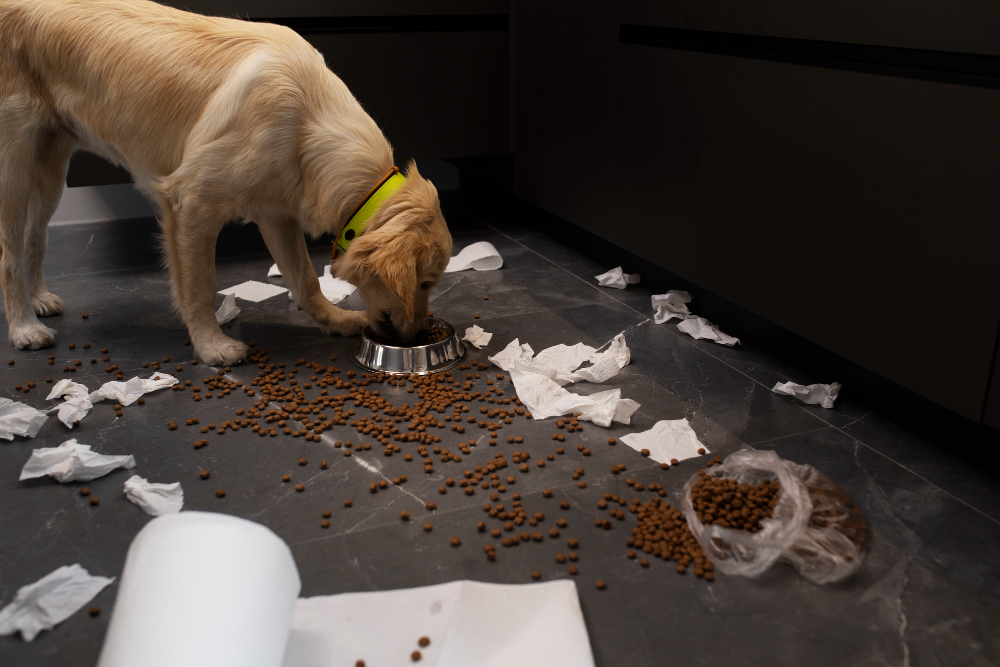Many dog owners have noticed something strange about their canine companions – an increased hunger level. It begs the question, “why is my dog suddenly hungry all the time?” This sudden and unexplained surge in appetite, particularly prevalent among older dogs, can be disconcerting. Let’s explore what’s behind this sudden shift and what it means for your furry friends.
Understanding Increased Appetite in Dogs
Polyphagia or Hyperphagia is the medical term for increased appetite in dogs, and can be a complex issue. The sudden change in your pet’s eating habits may seem benign but can sometimes signify underlying health concerns. For some, it’s an “older dog suddenly hungry all the time” scenario, a phenomenon that necessitates a closer look.
Understanding the risks of Hyperphagia
Hyperphagia is a disorder in which the dog is excessively hungry, and even if he feeds with the correct amount for his weight, stage of life and level of physical activity, he still does not feel satisfied, and may also interfere with his routine activities. Basically, polyphagia, as the disease is also called, is when food intake exceeds the necessary amount of food that the dog needs to live healthily, which can lead to other health problems, such as obesity.
Causes of Increased Appetite in Dogs
Age-related Changes
As dog’s age, their dietary needs and behaviors may change. But does that mean you should expect an “older dog suddenly be hungry all the time”? Not necessarily. It’s normal for dogs to have slight changes in their appetite as they age, but sudden or dramatic changes can indicate a health issue.
Health Conditions
Several health conditions can lead to an increased appetite in dogs. For instance, an “increased appetite in dogs with cancer” is not uncommon. Cancer can alter a dog’s metabolism, leading to increased hunger. Similarly, it’s not unusual to wonder, “why is my 15-year-old dog always hungry?” If your senior dog is always ravenous, it could be a sign of medical conditions such as diabetes, hyperthyroidism, or Cushing’s disease.
Psychological Factors
Occasionally, your dog’s increased hunger isn’t linked to a physical issue but a psychological one. Stress, anxiety, or boredom can lead to changes in eating behaviors.
Recognizing the Signs: Is Your Dog Really Hungry?
Knowing whether your dog is genuinely hungry or merely exhibiting food-motivated behavior can be tricky. Dogs are opportunistic creatures when it comes to food, and they can often behave as though they are hungry, even when they’re not. Here are several signs that your dog might indeed be hungry:
- Increased Agitation: If your dog becomes noticeably restless around meal times, it could be a sign that they’re genuinely hungry. They might pace, whine, or position themselves near the place where you typically serve their food.
- Excessive Licking or Pica: Dogs that are hungry might start to lick or chew non-food items. This behavior, known as pica, can indicate that your pet isn’t getting enough to eat. However, it can also be a symptom of nutritional deficiencies or other health problems, so it’s important to consult a vet if your dog exhibits this behavior.
- Excessive Drooling: While some breeds naturally drool more than others, excessive drooling, especially around meal times, can indicate your dog is hungry.
- Changes in Behavior: Sudden changes in behavior, like increased aggression or anxiousness, can also be signs of hunger. Your dog may become more clingy, bark more, or even try to get your attention by knocking over things.
- Changes in Body Condition: If your dog is genuinely hungry and not getting enough food, you might notice a change in their body condition. They might start losing weight, or their ribs, spine, and hip bones may become more prominent. If you notice these changes, it’s crucial to consult your vet immediately.
These signs are not exhaustive, and a dog might show one or more of them due to reasons other than hunger. Therefore, it’s essential to consider the context and look for multiple signs. If you’re still unsure about “why is my dog suddenly hungry all the time,” it’s best to seek professional advice. Regular check-ups can help ensure your dog’s dietary needs are being met appropriately and prevent potential health problems associated with both underfeeding and overfeeding. Remember that just like humans, dogs also eat “by gluttony”, so be aware if your dog is gaining weight. And, don’t forget to feed your dog only the daily amount of food it should eat, to avoid obesity and associated diseases.
What Foods Increase Appetite in Dogs?
Certain foods can stimulate your dog’s appetite more than others. High-fat, high-sodium foods, and those with strong smells can be particularly enticing for dogs, these foods are more palatable, and with that, they become more tasty and more attractive to dogs. However, consistently feeding your pet these types of food can result in overeating and potential health issues such as obesity and heart disease.
On the other hand, a balanced diet of lean proteins, fiber-rich vegetables, and healthy fats can help control your dog’s appetite. These types of foods are not only nutritious but can also keep your dog feeling fuller for longer. Thus, they can be part of the solution when you’re trying to figure out “how to deal with a dog that is always hungry.” But, never change your dog’s food without the guidance of a professional because homemade foods always will need mineral and vitamin supplementation to meet your dog’s physiological needs.
Dealing with a Dog that is Always Hungry
But what if you’re in a situation where it seems like no matter what you feed your dog, they’re always hungry? What do you do when you’re constantly asking, “why is my dog suddenly hungry all the time?” Here are a few strategies that could help.
- Exercise and Enrichment: Regular exercise can help regulate your dog’s appetite. A good play session or a long walk can distract them from constant begging and help them burn off excess calories. Additionally, mental stimulation from puzzle toys or training sessions can help keep their minds off food.
- Portion Control: Keeping a close eye on how much your dog is eating can be crucial in managing their appetite. Overfeeding can lead to an expectation of more food and potentially contribute to weight gain and related health issues.
- Regular Vet Visits: Regular vet visits can help catch any medical issues early on. If your “older dog is suddenly hungry all the time,” or you’ve noticed an “increased appetite in dogs with cancer,” your vet can provide guidance and a treatment plan if necessary.
Conclusion
Increased appetite in dogs is a complex issue with a multitude of potential causes and effects. As a responsible pet owner, it’s important to understand why your “15-year-old dog is always hungry,” or what to do when you notice an “increased appetite in dogs with cancer”. Recognizing the signs of true hunger, knowing what foods can increase appetite, and learning “how to deal with a dog that is always hungry” can go a long way in ensuring the health and happiness of your furry friend. Remember, when in doubt, always consult with a veterinarian. They can provide personalized advice and help unravel the mystery of your dog’s sudden increased appetite.

